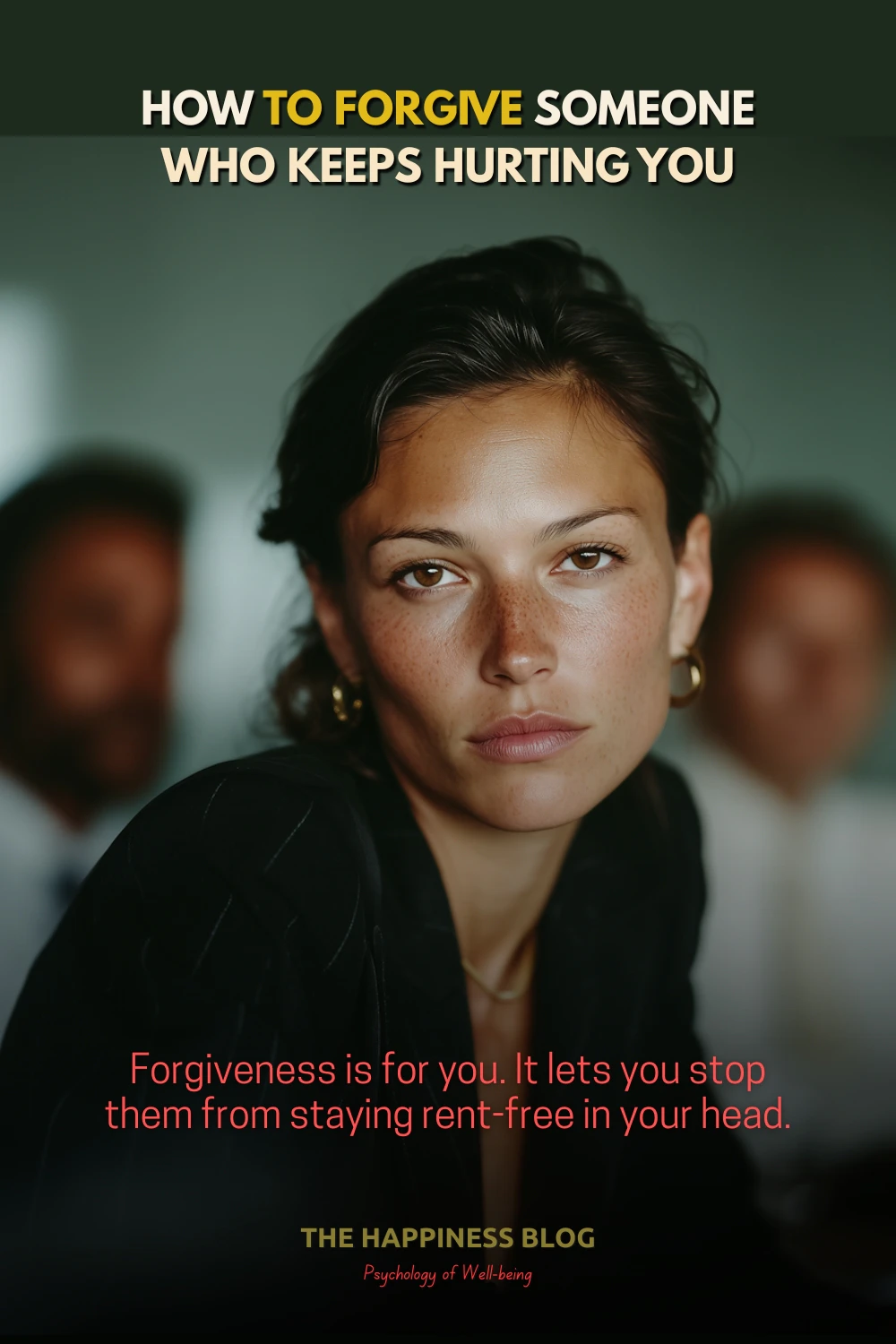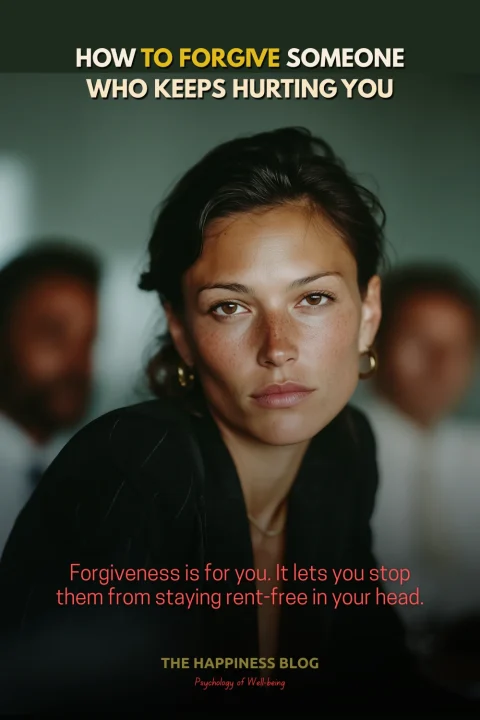Today's Sunday • 11 mins read
How do you forgive someone who keeps hurting you?
Forgiveness can feel impossible when the pain is fresh or ongoing. It’s even harder when the person refuses to take responsibility, denies your experience, or justifies their behavior.
When someone keeps wounding you, especially without remorse, your mind instinctively resists forgiving them. You may ask yourself, Why should I forgive someone who doesn’t even care?
Or you may fear that forgiveness will only invite more pain. That inner voice says, “If I forgive, they’ll think it’s okay to hurt me again.”
Yet forgiveness is not approval. It doesn’t excuse the harm or erase your boundaries. And it’s not a weakness.
As Gandhi said, “The weak can never forgive. Forgiveness is the attribute of the strong.”
True forgiveness begins when you decide your peace matters more than their behavior.
It’s a choice to stop carrying the emotional burden of their actions.
10 Tips To Forgive Someone Who Keeps Hurting
Everyone gets hurt. After the emotional storm settles, you might forgive, until they hurt you again, and the wound reopens.
Forgiving someone who keeps hurting you requires emotional clarity. It’s about protecting yourself while freeing your mind from resentment.
When the same hurt repeats, you may ask, Why forgive again? Because forgiveness is a gift you give yourself.
Here are 10 helpful steps to forgive someone who keeps hurting you.

1. Move Away From The Past
Living too much in the past keeps you stuck in pain.
Remind yourself that what happened is behind you. Don’t let old wounds control your present thoughts and emotions.
See it this way: Every person who enters your life has a purpose. Some stay for a while, others only for a lesson. Each plays a role in your personal story, even the difficult ones.
Accepting that truth helps you release people who hurt you without resentment. You can forgive some, distance yourself from others, and move forward with those who truly add value.
No one who hurt you has the right to decide if they remain in your life. That choice belongs only to you.
Forgiveness frees you from being trapped in your past and gives you the power to shape your future.
“Forgiveness does not change the past, but it does enlarge the future.”
2. Don’t Go To Sleep Angry
Try not to fall asleep with unresolved anger.
When you go to bed upset, your mind replays the conflict, deepening emotional stress. Anger carried into sleep hardens into resentment and affects your mood the next day.
A calm mind before sleep supports emotional healing. It allows your nervous system to reset and your subconscious to process the day’s events more peacefully.
“Let not the sun go down on your wrath.” — Apostle Paul
Take a few slow breaths before bed, listen to calming affirmations, or visualize how you’d like things to improve.
Even a few minutes of gratitude practice can help you release tension and let you rest more easily.
3. Stop Blaming Others
Blaming the offender keeps you emotionally stuck in the same story.
Accusing others feeds the illusion that your peace depends on someone else’s behavior. When you stop blaming, you start reclaiming control over your own reactions.
Even if the other person refuses to take responsibility, resist the urge to criticize or dwell on their faults.
No one can make you feel bad without your permission.
Emotions are powerful, but not always truthful. They will often lie to you. So, validate your emotions as information, but decide what to do with that.
Take responsibility for your response. That doesn’t mean excusing bad behavior; you’re choosing how you let it affect your peace of mind.
“Forgiveness is the fragrance that the violet sheds on the heel that has crushed it.” — Mark Twain
Forgiveness is an act of self-kindness. When you shift your focus from blame to understanding, you free up emotional energy for growth and clarity.
4. Stop Trying To Control People
Trying to control others leads only to frustration. You can’t decide how people think, feel, or behave—not even those closest to you.
Remind yourself that even your children come through you, not from you. Each person has their own path, shaped by their choices and experiences.
When you catch yourself judging or correcting others, pause and observe how it changes your mood. The tighter you try to hold on, the more tense and reactive you become.
Peace comes from letting go of the need to manage anyone’s behavior but your own.
The Stoics understood this well: focus on what’s within your control—your thoughts, values, and actions—and release what isn’t.
That’s how you protect your calm in an unpredictable world.
5. Reconnect With Yourself
When you’ve been hurt repeatedly, you can lose touch with your inner balance.
Reconnecting with yourself means choosing peace over turmoil and learning to care for your emotional well-being again.
Forgiveness starts with self-compassion. You don’t have to repair every broken relationship. Regaining peace doesn’t mean the other person is suddenly safe or healthy for you.
True healing begins when you rebuild your relationship with yourself, with self-love, patience, and respect.
“To forgive is to set a prisoner free and discover that the prisoner was you. You don’t have to repair your relationship with everyone you’ve forgiven.”
6. Learn the Art of Letting Go
Letting go is one of the hardest yet most freeing skills to learn. Some people will always disagree or criticize, no matter how well you do something.
Ease your inner rigidity by accepting that you can’t please everyone. The ability to reconsider your position when you discover new information is a sign of growth, not weakness.
Allow yourself to step into situations you once avoided. It builds emotional courage. Practice being okay with disagreement or disapproval while staying true to your values.
You can’t make people change their attitudes, but you can change how you respond to them. Gradually distance yourself—mentally or physically—from those who drain your energy or dismiss your worth.
When you stop expecting them to think or act differently, their behavior stops having power over you. You gain peace, and your relationship with yourself deepens.
“Forgiveness is one of the best forms of love you can give yourself.”
7. Aim to Be Kind Instead of Being Right
The need to be right often keeps old conflicts alive. When you focus on kindness over being right, you shift from ego to empathy.
Revenge and resentment only weigh you down. You don’t have to respond to every slight or prove your point in every argument. Sometimes peace is more valuable than victory.
When someone criticizes you, try not to take it personally. Tell yourself, “They’re not attacking my character, just pointing out something I can learn from.”
Managing anger takes practice. The next time frustration rises, pause and remind yourself, “I’m responsible for how I respond.”
That small mental shift, taking ownership of your emotions, makes forgiveness easier and relationships healthier.
8. Embrace the Dark Times
Negative emotions are part of being human. They often bring discomfort, but avoiding them only prolongs the pain.
See your darker emotions as signals, not threats. Grief, anger, and disappointment can teach you what matters and where you need healing.
Every meaningful goal requires moving through challenges. When you trust that better days follow every setback, your tolerance for discomfort grows.
Remember that hard times are temporary teachers, not permanent conditions.
Your perspective shapes your recovery. When you change the way you see adversity, you begin to change your life.
9. Talk About Your Feelings
Talking about your feelings helps you release what’s stuck inside. It’s not a sign of weakness—it’s a sign of strength and emotional maturity.
Bottling up emotions can lead to anxiety, irritability, or even physical symptoms. Sharing your thoughts helps your brain process them more clearly.
As the saying goes, “A problem shared is a problem half-solved.” When you open up, you often find others share similar struggles.
If you’re not used to expressing emotions, start small. Speak to a trusted friend or write your feelings in a journal. The more you practice, the safer it becomes to open up.

10. Ask for Help
You don’t have to face everything alone. No one is built to handle constant emotional pain in isolation.
If you feel overwhelmed or stuck in resentment, ask for help. People are often more willing to listen and support you than you might expect.
You can also join a support group or talk to a counselor who understands the process of healing through forgiveness. Sometimes a compassionate listener helps you see your situation more clearly.
Seeking help isn’t weakness—it’s self-respect. It shows that your well-being matters and that you’re ready to heal.
Why Is Forgiveness Difficult?
Forgiveness has many benefits and doesn’t depend on anyone else. Yet it often feels difficult for two main reasons.
First, when someone wrongs you, it’s natural to feel angry and want to restore your sense of power. Second, identifying as the victim can make you fear losing the connection or re-experiencing the pain if you forgive.
The key to overcoming these barriers is self-awareness—understanding your own emotions and motives. Forgiveness requires both willingness and willpower. Before you forgive, ask yourself whether you truly want to.
If you’re still hurting or the person hasn’t shown remorse, it’s okay to wait. Don’t rush forgiveness before you’ve recognized and expressed your pain. Genuine forgiveness can’t come from suppression.y identified, expressed, and released your pain or anger.
Psychology of Forgiveness
Forgiveness is a complex emotional process with proven mental and physical benefits. It reduces stress, improves mood, and strengthens resilience.
Research highlights several traits that support forgiveness: empathy, emotional regulation, and the ability to take another’s perspective.
Psychologists like Enright, Gassin, and Wu (1992) clarify that forgiveness differs from pardon, condoning, excusing, or reconciliation. Forgiveness doesn’t justify the wrong or restore the relationship. It simply releases your emotional hold on the hurt.
Intentional forgiveness involves five basic steps:
- Acknowledge the harm. Accept the pain caused instead of minimizing it.
- Choose to forgive. Decide consciously to let go of resentment.
- Practice empathy. Try to understand, without excusing, the other person’s behavior.
- Release resentment. Stop feeding thoughts of anger and revenge.
- Set boundaries. Protect yourself from further harm while keeping your peace.
The Essence of Forgiveness
Forgiving someone who isn’t sorry may feel impossible, but remember—forgiveness is for you.
It means evicting them from the “rent-free space” they’ve occupied in your mind. It’s choosing not to let their behavior dictate your emotional state.
Physical distance can help, but the real freedom comes from clearing the mental space they once controlled. This shift transforms your inner environment from tense to calm.
“Holding on to anger is like grasping a hot coal with the intent of throwing it at someone else; you are the one who gets burned.” — attributed to Buddha
Setting boundaries is part of forgiveness, not the opposite of it. You can forgive without telling them, reconnecting, or forgetting what happened.
Forgiveness is release. It’s how you reclaim your peace.
Final Words
“Forgiveness is the key to action and freedom.” — Hannah Arendt
Forgiving a habitual abuser is never easy. Yet when you release judgment and resentment, the process of self-healing begins.
Abuse can be physical, emotional, or psychological. Regardless, forgiving someone who repeatedly causes harm is deeply challenging.
But it’s still something you do for your own peace, not theirs.
You know you’ve truly forgiven when their name or presence no longer stirs anger or pain. Forgiveness doesn’t mean forgetting; it means freeing yourself from their hold.
“Forgiveness is not about forgetting. It is about letting go of another person’s throat.” — William Paul Young
Forgiveness takes time and courage. If the process feels overwhelming, reach out for support. Healing is lighter when shared.
• • •
Author Bios: Leon Collier, a freelance writer, wrote a short, early version of it. Rewritten, expanded, researched, and edited by Sandip Roy.
√ Also Read: How To Forgive Yourself?
√ If you enjoyed this, please share it.
